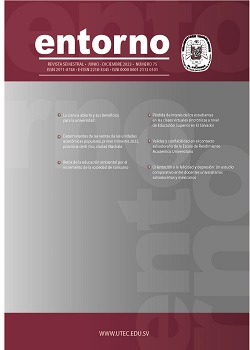The Challenges of Environmental Education due to the Increase of Consumer Society
Published 2024-02-26
Keywords
- Environment - Social aspects,
- Town planning,
- Population - Statistics,
- Natural resources,
- Environmental education
Copyright (c) 2023 Universidad Tecnóloga de El Salvador

This work is licensed under a Creative Commons Attribution-NonCommercial-ShareAlike 4.0 International License.
How to Cite
Abstract
During the past decades, world population has experienced significant economic growth, largely influenced by advances in science and technology. Unfortunately, this growth has not been developed
in parallel with the environment, therefore, economic growth is inversely proportional to what is known as environmental sustainability and “development” in most cases.
Consumption per se is valid and necessary for the development of a society. However, when it is carried out without control and without measures to lessen its effects, it creates environmental problems that
lead to the extinction of some natural resources. The waste generated by said products affects not only the society producing and “enjoying” them, but also other people around them—whether directly or indirectly.
Specific and general actions must be implemented in the face of the damage caused to the environment given the exploitation of its natural resources, with the purpose of educating citizens for them
to become responsible consumers. In addition to this, a dissemination and environmental training plan must also be enforced in order to generate a change in the population towards a more respectful
attitude in relation to the environment. In view of this, this article analyzes the challenge faced by environmental education in order to modify behavioral and attitudinal patterns and values which
promote awareness and put an end to the damage being inflicted on the environment.
